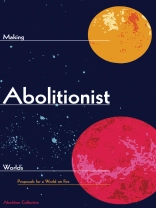Making Abolitionist Worlds gathers key insights and interventions from today’s international abolitionist movement to pose the question: what does an abolitionist world look like? The Abolition Collective investigates the core challenges to social justice and the liberatory potential of social movements today from a range of personal, political, and analytical points of view, underscoring the urgency of an abolitionist politics that places prisons at the center of its critique and actions.
In addition to centering and amplifying the continual struggles of incarcerated people who are actively working to transform prisons from the inside, Making Abolitionist Worlds animates the idea of abolitionist democracy and demands a radical re-imagining of the meaning and practice of democracy. The Abolition Collective brings us to an Israeli prison for a Palestinian feminist reflection on incarceration within settler colonialism; to protest movements in Hong Kong and elsewhere, that use “abolition democracy” to advocate for the abolition of the police; to the growing culture of “aggrieved whiteness” in the United States, which trucks in fear, anger, victimhood, and a demand for vengeance to maintain white supremacy; to the punitive landscapes that extend from the incarceration of political prisoners to the mass deportations and detentions along the U.S. southern border.
Making Abolitionist Worlds shows us that the paths forged today for a world in formation are rooted in antiracism, decolonization, anticapitalism, abolitionist feminism, and queer liberation.
Inhaltsverzeichnis
Introduction
Manifesto of the Abolition Journal
Dis-Organizing Prisons and Building Together, Inside/Outside—Stevie Wilson
It Has to Burn Before It Can Grow: An Interview with Amanda Priebe—Brooke Lober
Burn It Down: Abolition, Insurgent Political Praxis, and the Destruction of Decency—Katherine, Kelly, and Abraham
Already Something More: Heteropatriarchy and the Limitations of Rights, Inclusion, and the Universal—J Sebastian
Democracy Against Representation: A Radical Realist View—Paul Raekstad
A Family Like Mine—Shana L. Redmond
Abuse Thrives on Silence: The #Vaughn Rebellion in Context—Kim Wilson
From the Vaughn Uprising: “For a Safer, More Secure, and More Humane Prison.” On Behalf of the Prisoners at James T. Vaughn Correctional Center
Aggrieved Whiteness: White Identity Politics and Modern American Racial Formation—Mike King
Abolitionist Democracy: Fear, Loathing, and Violence in the 2016 Campaign—Joy James
The Pitfalls of White Liberal Panic—Dylan Rodríguez
As the US Oligarchy Expands Its War, Middle Class White People Must Take a Side—Robert Nichols
Notes on Photography, Power, and Insurgent Looks—Stefanie Fock
We Can Be Here Another Five Hundred Years: A Critical Reflection on Shiri Pasternak’s Grounded Authority—Nick Estes
How Does State Sovereignty Matter?—Shiri Pasternak’s Response to Nick Estes
Zionism and Native American Studies—Steven Salaita
I Will Kiss the Ground of My Cell… As It Is Part of My Homeland, Spatial Politics and Gender: Israel’s Carcerality of Palestinian Women—Nicole Printy
Is Marxism Relevant? Some Uses and Misuses—David Gilbert, political prisoner.
Meeting Mumia Abu-Jamal: The Most Well-Known Political Prisoner in the US—Robyn C. Spencer
Art by: Heidi Sincuba, Amanda Priebe, Nilda Brooklyn and Adrien Leavitt, Priti Gulati Cox, Jesus Barraza and Melanie Cervantes, and Jess X. Snow
Über den Autor
Abolition: A Journal of Insurgent Politics is a collectively-run project supporting radical scholarly and activist ideas, poetry, and art that encourages us to make the impossible possible, to seek transformation well beyond policy changes, and toward revolutionary abolitionism.












